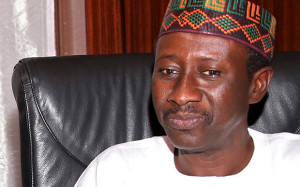
The National Security Adviser (NSA), Babagana Monguno has said the rate of maritime crimes on the Gulf of Guinea is depriving the region of economic development.
Monguno made this known on Thursday, during the 4th Assembly of Heads of State and Government of the Gulf of Guinea Commission held in Abuja.
He said it is important to address the security challenges confronting member states of the Gulf of Guinea Commission, which continues to impact negatively on the development of the region.
He called for concerted and unrelenting efforts by all stakeholders, noting that the Gulf of Guinea Commission provides a veritable platform for tackling these numerous security challenges.
He urged increased cooperation and collaboration among member states as well as support for the Gulf of Guinea commission to enhance its capacity to deliver on its mandate.
He said the Commission is a framework for consultations among the countries of the Gulf of Guinea for cooperation and development.
He said it is also for prevention, management and resolution of conflicts that may arise from the delimitation of borders and the economic and commercial exploitation of natural resources within the territorial boundaries.
He said the current situation in the Gulf of Guinea region with increased illegal activities of piracy, illicit drugs, human trafficking, illegal immigration, environmental pollution and degradation calls for greater attention by member countries.
He added that maritime security and economic prosperity are interdependent and mutually reinforcing.
He said, “Improvement of maritime security can positively contribute to increased national, regional and continental stability and by the same token make a substantial contribution to global security.”
President Muhammadu Buhari and his counterparts from other Gulf of Guinea countries were absent at the event.
Buhari was represented by Vice President Yemi Osinbajo, as the fourth summit of the eight -member nation holds at the Transcorp Hilton Hotel, Abuja.
The Gulf of Guinea Commission was established by a Treaty signed in Libreville, Gabon, on July 3, 2001 by Angola, Congo, Gabon, Nigeria and Sao Tome and Principe.
The treaty constituted a permanent Institutional framework for cooperation amongst the countries bordering the Gulf of Guinea in order to defend their common interest and promote peace and socio-economic development based on dialogue, consensus, ties of friendship, solidarity and fraternity.
Cameroon and Democratic Republic of Congo joined the Gulf of Guinea Commission in 2008.
While Buhari was represented by Osinbajo, the president of Gabon, Ali Bongo, was also represented by his deputy, Pierre-Claver Maganga.
The president of Equatorial Guinea, Teodoro Obiang Mbasogo, was represented by the country’s Prime Minister Vicente Tomi; President Paul Biya of Cameroon was being represented by the Foreign Affairs Minister of the country, Mbella Mbella; the Democratic Republic of Congo’s president, Joseph Kabila, that of Congo, Dennis Sassous Nguessou and that of Angola, Joao Lourenco were all represented by their ambassadors in Nigeria.
Copyright Ships & Ports Ltd. Permission to use quotations from this article is granted subject to appropriate credit given to www.shipsandports.com.ng as the source.